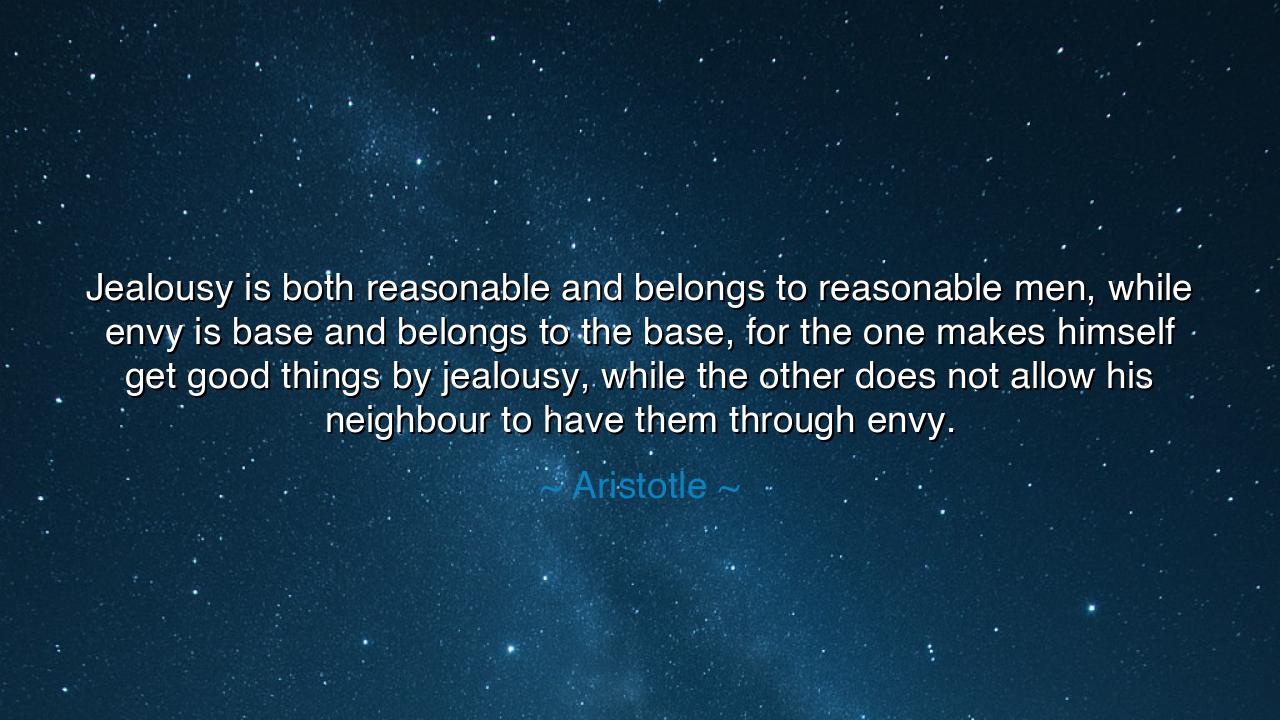
Jealousy is both reasonable and belongs to reasonable men, while
Jealousy is both reasonable and belongs to reasonable men, while envy is base and belongs to the base, for the one makes himself get good things by jealousy, while the other does not allow his neighbour to have them through envy.






“Jealousy is both reasonable and belongs to reasonable men, while envy is base and belongs to the base, for the one makes himself get good things by jealousy, while the other does not allow his neighbour to have them through envy.” – Aristotle
Hear these words, O student of virtue, and let the wisdom of Aristotle, the great philosopher of Athens, illuminate your heart. In this teaching, he draws a line as sharp as a blade between two emotions that are often mistaken as one: jealousy and envy. Both spring from desire, yet they bear opposite fruits. Jealousy, he says, can belong to the wise and noble, for it stirs one to action—to labor for excellence, to strive for the good that others possess. But envy, dark and twisted, belongs to the ignoble, for it wishes not to rise by effort, but to drag others down into ruin. One builds the soul; the other poisons it.
Aristotle, who studied the nature of the human spirit as one might study the stars, knew that emotion itself is not evil. It is the misuse of emotion that leads to vice. To feel jealousy, in his view, is to recognize that another has achieved something worthy—and to be moved by that recognition to seek the same for oneself. The jealous man says, “He has done well; so too shall I strive to do.” In this way, jealousy can become a spark of virtue, a call to growth. But envy is the corruption of this fire—it seeks not to emulate, but to extinguish. The envious man whispers, “If I cannot have it, no one shall.” Thus jealousy aspires, while envy destroys.
Look to history, and you will see this truth reflected in the deeds of men. When Alexander the Great beheld the heroes of old—Achilles, Hercules, and the kings of Persia—he was filled with jealous admiration. He did not curse their greatness; he sought to surpass it. His jealousy became the forge of his ambition, driving him to carve an empire that stretched across the known world. Yet contrast this with the story of Cain and Abel, the first brothers of the earth. When Abel’s offering found favor before God, Cain did not strive to improve his own; instead, envy darkened his heart, and he struck his brother down. Thus from envy came the first blood of man—a lesson that has echoed through every generation since.
Aristotle’s distinction is not merely philosophical; it is spiritual. He understood that jealousy, when purified by reason and guided by virtue, becomes aspiration—a noble hunger to grow. But envy, ruled by bitterness and pride, becomes decay—the slow death of the spirit. The jealous man gazes upward and climbs; the envious man gazes sideways and stumbles. One honors greatness by seeking to share in it; the other despises greatness because it exposes his own smallness.
There is deep humility hidden within Aristotle’s teaching. He reminds us that it is natural to desire what is good and admirable, but we must channel that desire through wisdom. To feel jealousy is to admit that there is something to learn, something to strive for—that we are not yet complete. But envy refuses this humility. It denies the goodness of others out of wounded pride, and thus becomes a prison for the soul. In every age, those who envy waste their energy wishing for others’ downfall, while the jealous-but-just transform that same energy into the fire of creation.
Consider the artist who sees another’s masterpiece and feels the pang of jealousy—that ache that says, “I too wish to create such beauty.” If he is wise, he will return to his work with renewed vigor, and his own art will rise to meet the challenge. But if envy claims him, he will sneer, belittle, and gossip, killing his own inspiration in bitterness. So it is with all pursuits—whether in art, in love, or in virtue itself—the difference between greatness and ruin lies not in desire, but in the heart that wields it.
So, O child of reason, remember this: jealousy can be a teacher, but envy is a thief. When you see the success of others, do not let bitterness enter you; let gratitude and motivation take its place. Ask not, “Why them and not me?” but “How may I rise as they have?” Let another’s excellence be your inspiration, not your despair. For the one who turns jealousy into effort grows in both virtue and strength, while the one who nurses envy shrinks beneath the weight of his own resentment.
And thus, Aristotle’s words echo through the ages as both warning and guide: jealousy, when governed by reason, ennobles the spirit; envy, born of baseness, corrodes it. Cultivate the one, cast out the other, and you will walk the path of wisdom. For the noble heart does not resent greatness—it seeks to join it.






AAdministratorAdministrator
Welcome, honored guests. Please leave a comment, we will respond soon